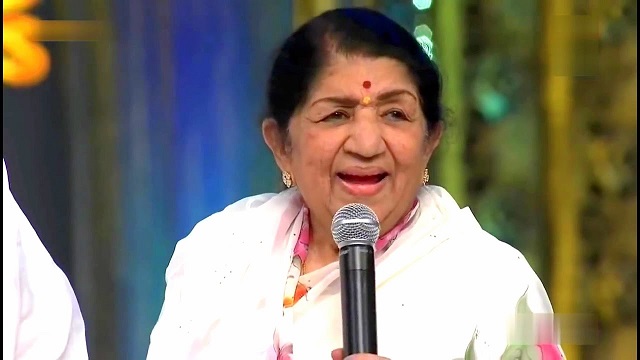In an interview to this writer, singer-songwriter Sona Mohapatra had claimed there were barely eight songs out of 100 in a year in Hindi cinema, that were sung only by a female vocalist. She said it was a travesty in a country which has celebrated the legacy of veteran singer Lata Mangeshkar from the 1940s for the next six decades. While it is a disservice to her immeasurable talent to nitpick a few of her songs, after much deliberation, here are the most memorable songs of the Nightingale of India, across her over-70-year-long career. Aaj Phir Jeene Ki Tamanna Hai - Guide There could not have been a more poetic song to dedicate to Mangeshkar’s iconic career than this song from Vijay Anand’s 1965 romantic drama, filmed on Waheeda Rehman and Dev Anand. The lyrics by Shailendra truly lead the pack here, but its resonance would not have reached quarters far and wide without the music of SD Burman, and the voice of the one with timeless grace.
Naam Gum Jayega - Kinara This song from Gulzar’s 1977 directorial defines what will come to be known as Mangeshkar’s legacy. Picturised on Hema Malini and Jeetendra, this RD Burman song explains why she will be remembered for decades - “Naam gum jaega, chehra ye badal jaega; Meri aawaz hi pehchan hai, gar yaad rahe” [The name and face will fade but the voice shall remain immortal]. Though it is a duet song [paired with Bhupinder], this one had to make the cut only because Mangeshkar leads the track with her distinguished voice.
Aye Dil-E-Nadaan - Razia Sultan Picturised on Malini again, this haunting track by Khayyam from Kamal Amrohi’s 1983 period drama is an understated gem in Mangeshkar’s illustrious career. She has often said it is one song that stayed with her after the recording, unlike many of the classics she had sung in the past. This must have had a lot to do with how Khayyam arranged the song, where Mangeshkar got to jam with not only the musical instruments but also pauses, to present a unique blend of melody and restraint.
Lag Jaa Gale - Wo Kaun Thi? There could not have been a more delicate touch to Raj Khosla’s 1964 psychological mystery film than to watch Sadhana belt out this number, rather celestially, to Manoj Kumar in black-and-white. Music composer Madan Mohan embellished this evergreen song with playful interludes but also allowed Mangeshkar to leave an indelible impression on the listeners with her voice, too melodious to belong to this world.
Ek Pyar Ka Nagma Hai - Shor When Mangeshkar sings to you how to lead your life, you listen. Why wouldn’t you, given her angelic voice? While there are a couple of lines here by Mukesh, Mangeshkar leads the way in inimitable fashion, in this song from Manoj Kumar’s 1972 film. Composed by Lakshmikant-Pyarelal, the track was filmed on Nanda and Kumar.
Ajeeb Dastan Hai Yeh - Dil Apna Aur Preet Parai Another life lesson, or more of philosophical musings, immortalised by Mangeshkar. This 1960 film had Meena Kumari, the tragedy queen, merrily sing away a Shankar-Jaikishan song. Their music, along with the ruminative lyrics of Shailendra, brought alive the inherent optimism in Mangeshkar’s eyes. Kumari only looked ethereal, not even remotely odd, lip-syncing to Mangeshkar’s honeyed voice.
Chalte Chalte Yun Hi Koi Mil Gaya Tha - Pakeezah This song makes it to the list to demonstrate Mangeshkar’s unparalleled range in emoting various moods. Filmed on Kumari again, Mangeshkar does a U-turn from ‘Ajeeb Dastan Hai Yeh’, by lending a much-needed touch of melancholy to Ghulam Mohammed’s posthumous song, inspired by Thumri. The loop, both in her voice and his arrangement, only added to the appeal of the track, rather than lend it any kind of monotony.
Mera Saaya Sath Hoga - Mera Saaya Another Madan Mohan composition from another Raj Khosla film, from 1966, the haunting title song will continue to give strength to avid fans of Mangeshkar’s songs. While the film witnessed her sister Asha Bhonsle’s dance song ‘Jhumka Gira Re’ become more popular overtime, ‘Mera Saaya Sath Hoga’, filmed on Sunil Dutt, encapsulates both the spirit of the narrative and our articulation of what the veteran singer leaves behind.
Tujhse Naaraz Nahi Zindagi - Masoom Though there was an equally popular male version of this song by Anup Ghoshal, this rendition by Mangeshkar has stood the test of time. Her heartfelt vocals bring to the fore the latent emotion behind the lyrics, penned by Gulzar. The RD Burman track was a fresh gem amidst all the dance/disco songs he was composing in the 1980s, and Mangeshkar left no stones unturned in making it stand out in his impeccable discography.
Luka Chuppi - Rang De Basanti While Mangeshkar had collaborated with the composer AR Rahman in the past [’_Jiya Jal_e’ from Dil Se and ‘O Palan Hare’ from Lagaan], it was the first time the two singers jammed together in a song. Rakeysh Omprakash Mehra made it possible through his 2006 film. The song highlights the emotional bond between a mother and a son, and the powerful emotion behind this jugalbandi could not have been captured by any other singer[s]. Rahman had mentioned his father used to pray to a picture of Mangeshkar in a white sari before composing music. This song, along with her entire career, explains why she needs to be evoked before taking up any musical journey.


)
)
)
)
)
)
)
)
)



